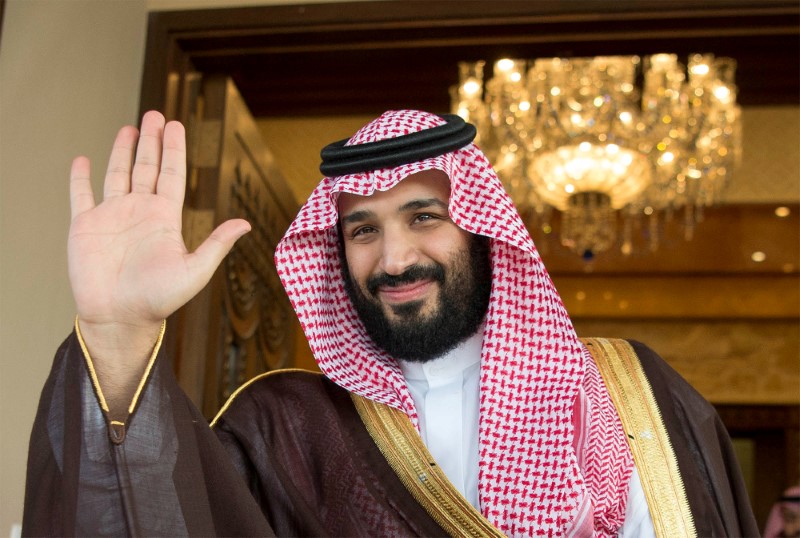By Katie Paul, Marwa Rashad and Reem Shamseddine
RIYADH (Reuters) - The prince overseeing Saudi Arabia's economy said his radical reforms were succeeding in protecting the kingdom against low oil prices, and he promised massive investments in coming years to help diversify the economy beyond oil.
"Although our prices dipped to as low as $27 for more than one year...the government managed to shield economic indicators from the negative impact," Deputy Crown Prince Mohammed bin Salman said in a rare nationally televised interview on Tuesday.
"Gross domestic product is still growing - not at global rates, true, but it is not going into deflation."
He said more than half of the tens of billions of dollars that Riyadh expects to raise by selling shares in national oil giant Saudi Aramco would be reinvested domestically by the kingdom's top sovereign wealth fund, the Public Investment Fund (PIF), to create jobs and earn revenue.
In the three years after the share sale, the PIF will spend over 500 billion riyals ($133 billion), with between 50 and 70 percent going to develop promising non-oil sectors such as mining and logistics within Saudi Arabia, he added.
Prince Mohammed, 31, first described his reform plans to the public in a nationally televised appearance almost exactly a year ago.
At that time he faced a grim economic challenge: low oil prices had saddled the government with a record $98 billion budget deficit in 2015. Financial markets had started to speculate that Saudi Arabia might eventually default on its debt or be forced to scrap the riyal's peg to the U.S. dollar.
In recent months the outlook has improved. The deficit has started to shrink and Riyadh has bought itself time to reduce its reliance on oil by establishing a program of overseas bond issues, reducing the need to draw down its financial reserves.
Other top Saudi officials trumpeted those achievements in presentations to hundreds of foreign bankers and investors at a Riyadh investment conference organized by Euromoney magazine on Tuesday.
Finance minister Mohammed al-Jadaan said the government was on track to cut its deficit to about $53 billion this year, and that the government was so far in 2017 paying over 90 percent of its bills to the private sector within 30 days of the due date.
Delayed payments by the government were a big drag on the economy last year, and in December authorities promised they would in future make all payments within a less stringent target of 60 days.
PROBLEMS
Big uncertainties still overshadow Saudi Arabia's effort to restructure its economy. One is how much money the government can raise through the sale of the Aramco shares. It has predicted the sale will value the company at $2 trillion, but some private analysts expect a significantly smaller figure.Prince Mohammed indicated on Tuesday, however, that the Aramco sale would go ahead along the lines he described a year ago, saying a stake close to 5 percent would be offered in 2018.
He also said authorities would announce a program to address the kingdom's shortage of private housing in the third quarter of this year, aiming to arrange the construction of over a million housing units through soft loans or the Saudi Real Estate Development Fund. He did not give a time frame.
Much of the Prince Mohammed's economic plan envisions transferring responsibility for development projects and public services to the private sector from the government.
For example, Prince Mohammed said that while the government was committed to providing medical treatment to its citizens, it would not necessarily manage hospitals. Officials have begun preparing plans to sell off some hospitals, perhaps through private equity deals.
The government's austerity policies have brought growth of the non-oil part of the economy near zero. In an effort to support growth, the government reversed a highly unpopular austerity step last month, restoring allowances to public sector workers after cutting them last September to save money.

Prince Mohammed said the relaxation of austerity was due to improved oil and non-oil revenues. But he added that the government was prepared to restore austerity steps if state finances passed through another crisis.